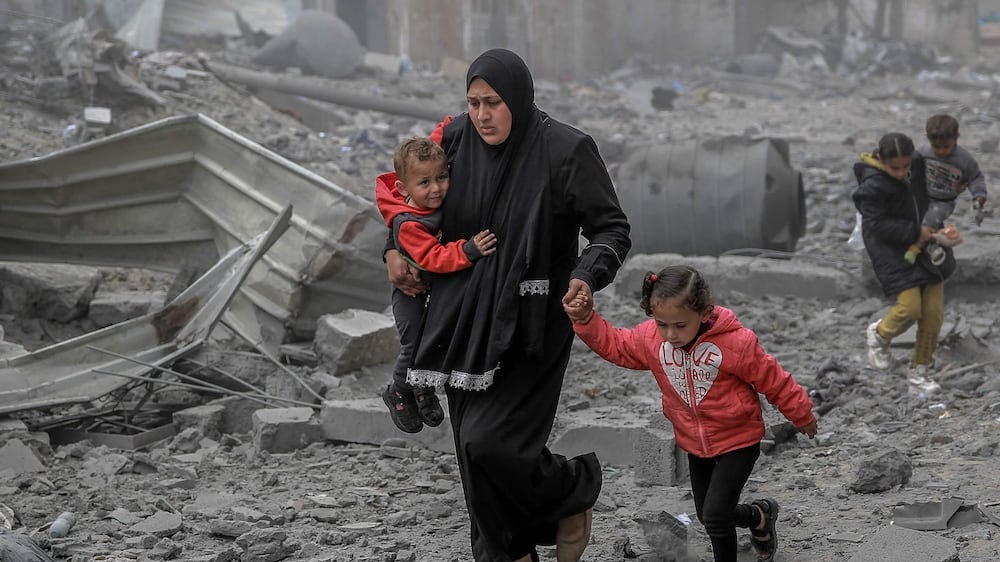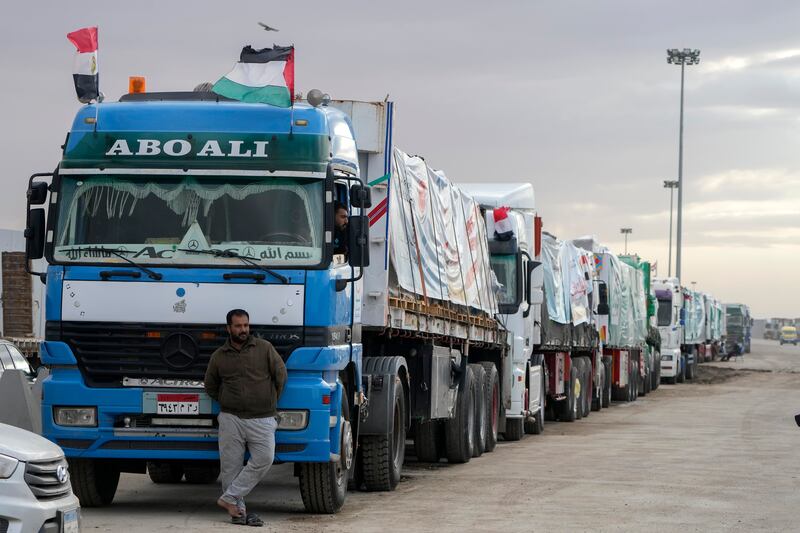Live updates: Follow the latest from Israel-Gaza
Israel has been preventing life-saving aid from entering Gaza by enforcing arbitrary requirements, humanitarian groups say, with entire lorries full of essential goods being turned back and items rejected without clear reasons being given.
Aid workers say the number of prohibited items is growing and includes equipment needed for surgeries, cancer treatment and sewage systems.
In the first two weeks of March, less than half of the aid missions to northern Gaza were facilitated by Israel.
“That's 11 out of 24 missions. The rest were either denied or postponed,” Farhan Haq, the deputy spokesman for the UN Secretary General, told The National.
“Truck convoys are frequently turned back even after long waits at the Wadi Gaza checkpoint.”
More than 1.1 million people face “catastrophic hunger” and famine before May unless more aid is allowed in to the enclave, a UN-backed report said on Monday.
UN human rights chief Volker Turk followed up on the report's publication by suggesting Israel's restrictions on aid could be part of a “war crime”.
“The extent of Israel's continued restrictions on entry of aid into Gaza, together with the manner in which it continues to conduct hostilities, may amount to the use of starvation as a method of war, which is a war crime,” said Mr Turk, the UN High Commissioner for Human Rights.
Before the war began on October 7, Gaza needed 500 lorries of aid a day to meet the basic needs of its 2.3 million people crammed into an enclave under a blockade by Israel and Egypt.
Now, an average of 150 lorries are entering Gaza each day, according to the World Food Programme, despite the need for food, medical supplies and shelter skyrocketing during more than five months of the devastating war that has killed at least 31,800 people and injured more than 73,700.
“We need the Israeli military to guarantee safe sustained and unhindered aid across Gaza, and to open up all possible entry points into Gaza,” Mr Haq said.
“The only way to deliver aid on a large scale and at the scale required to avert imminent famine is by road.”
Humanitarian groups told The National that not enough aid has been able to enter due to the inspection processes of Israeli authorities, who control the lorries' passage into Gaza via the Kerem Shalom crossing and the Rafah border crossing with Egypt.
Palestinian Red Crescent Society spokeswoman Nebal Farsakh, whose organisation processes most of the aid through Rafah, said the inspection process is excessively long and intentionally left vague by Israel.
She said Israeli authorities have not provided an official list of prohibited items, leaving NGOs scrambling to figure out which goods could put entire lorries full of aid at risk of being rejected.
“Entire trucks are turned back if one single item does not meet their requirements,” said Ms Farsakh.
“They also do not reveal which item or items are prohibited aboard that truck, so we are left guessing. I cannot tell you for sure what items are banned.”
Her comments are in line with an Oxfam report published this week that said Israeli authorities “are leading a dysfunctional and undersized inspection system that keeps aid snarled up, subjected to onerous, repetitive and unpredictable bureaucratic procedures that are contributing to trucks being stranded in giant queues for 20 days on average.”
The report also said that the authorities are “routinely and arbitrarily rejecting items of aid as having “dual (military) use.”
Last week, UNRWA's Commissioner General Philippe Lazzarini said a lorry loaded with aid was turned back because it contained scissors inside a medical kit for children.
“Medical scissors are now added to a long list of banned items the Israeli authorities classify as 'for dual use',” Mr Lazarrini said.
“The list includes basic and life-saving items: from anaesthetics, solar lights, oxygen cylinders and ventilators, to water cleaning tablets, cancer medicines and maternity kits,” he said.
Speaking to The National, Norwegian Refugee Council's Mena regional media and communications adviser, Ahmed Bayram, said these delays and arbitrary decisions on what is allowed to enter are having a real impact on the ground.
“Toolkits, like medical toolkits, that enter Gaza are often missing key items as a result. That also includes shelter or tent toolkits,” he said.
Other important items required for creating makeshift toilets and sewage systems, such as plastic pipes, are also banned, the Red Crescent said.

Additionally, all inspections stop on Jewish holidays, Ms Farsakh said.
“So if there are trucks that haven't been inspected the day before, they won't go in on a Saturday, for example.”
Israel has repeatedly claimed that it is not placing limits on aid entering Gaza, and blamed NGOs for its slow entry.
It has also accused Hamas of smuggling weapons into Gaza via aid and suggested that checks were necessary to prevent this.
“If the UN wants to see more aid in north Gaza, it should co-ordinate more convoys,” Elad Goren, of Israel's main body for letting aid into Gaza – the Co-ordination of Government Activities in the Territories (COGAT), told AFP last week.
“The trucks that are rejected are sent back for repackaging because they contain … materials that Hamas can use for their terrorist activities.”
UNRWA responded to Mr Goren's claims by saying: “The issue is with the Israeli authorities not allowing enough aid in or commercial supplies.”
Famine imminent in north Gaza, says UN-backed report

Barely any hospitals continue to function in Gaza and those that do are overwhelmed and in dire need of basic supplies, the health ministry has said.
Thousands of women are pregnant and many have given birth without any anaesthesia, the ministry and doctors have previously said. Amputations are rampant in the absence of basic solutions that prevent infections.
While Israel has always screened lorries that enter Gaza, Mr Bayram said that they had previously not taken this long, and authorities should apply inspections in “good faith.”
PRCS's Ms Farsakh highlighted the difference in how aid has flowed into Gaza since the week-long ceasefire in November last year when more than 200 trucks were entering Gaza every day.
In November, lorries coming in from Egypt via Rafah were allowed to drive all the way through into Gaza without transferring the aid on to Palestinian lorries, she said.
“Now, having to offload and onload everything by hand, if it is even allowed through, just adds more delays, and more waiting times, especially given the limited number of companies and operators on the Palestinian side that are allowed to carry the aid through,” she said.
The National has reached out to COGAT to ask which items are prohibited from entering Gaza, why an official list has not been published and why items such as water purification tablets and cancer medication had been denied. No response had been received at the time of publication.






